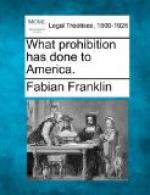anything that is worth having. But to the Socialist
the matter presents itself in no such light.
He sees a mass of misery which he believes—and
in large measure justly believes—Socialism
would put an end to; and he has no patience with the
conservative who points out—and justly points
out— that the poverty is being steadily,
though gradually, overcome in the advance of mankind
under the existing order. “Away with it,”
he says; “we cannot wait a hundred years for
that which we have a right to demand today.”
And “away with it” we ought all to say,
if Socialism, while doing away with it, would not
be doing away with something else of infinite value
and infinite benefit to mankind, both material and
spiritual; something with which is bound up the richness
and zest of life, not only for what it is the fashion
of radicals to call “the privileged few,”
but for the great mass of mankind. That something
is liberty, and the individuality which is inseparably
bound up with liberty. The essence of Socialism
is the suppression of individuality, the exaltation
of the collective will and the collective interest,
the submergence of the individual will and the individual
interest. The particular form—even
the particular degree—of coercion by which
this submergence is brought about varies with the
different types of Socialism; but they all agree in
the essential fact of the submergence. Socialism
may possibly be compatible with prosperity, with contentment;
it is not compatible with liberty, not compatible
with individuality. I am, of course, not undertaking
here to discuss the merits of Socialism; my purpose
is only to point out that those who are hostile to
Socialism must cherish liberty. And it is vain
to cherish liberty in the abstract if you are doing
your best to dry up the very source of the love of
liberty in the concrete workings of every man’s
daily experience. With the plain man—indeed
with men in general, plain or otherwise—love
of liberty, or of any elemental concept, is strong
only if it is instinctive; and it cannot be instinctive
if it is jarred every day by habitual and unresented
experience of its opposite. Prohibition is a restraint
of liberty so clearly unrelated to any primary need
of the state, so palpably bearing on the most personal
aspect of a man’s own conduct, that it is impossible
to acquiesce in it and retain a genuine and lively
feeling of abhorrence for any other threatened invasion
of the domain of liberty which can claim the justification
of being intended for the benefit of the poor or unfortunate.
So long as Prohibition was a local measure, so long
even as it was a measure of State legislation, this
effect did not follow; or, if at all, only in a small
degree. People did not regard it as a dominant,
and above all as a paramount and inescapable, part
of the national life. But decreed for the whole
nation, and imbedded permanently in the Constitution,
it will have an immeasurable effect in impairing that
instinct of liberty which has been the very heart




